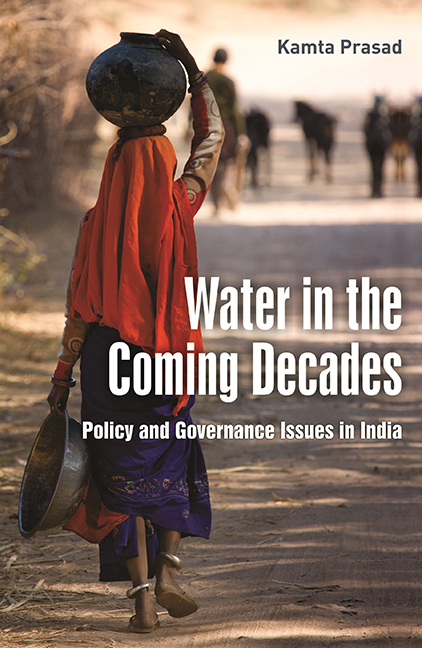Book contents
- Frontmatter
- Dedication
- Contents
- List of Tables
- List of Abbreviations
- Preface
- Acknowledgements
- Section I Overall Perspectives
- Section II Situational Analysis
- Section III Socio-economic, Institutional and Environmental Aspects
- Section IV Technological Options
- Section V Concluding Observations
- References
- Index
3 - Tardy Implementation of Reforms
Published online by Cambridge University Press: 13 July 2022
- Frontmatter
- Dedication
- Contents
- List of Tables
- List of Abbreviations
- Preface
- Acknowledgements
- Section I Overall Perspectives
- Section II Situational Analysis
- Section III Socio-economic, Institutional and Environmental Aspects
- Section IV Technological Options
- Section V Concluding Observations
- References
- Index
Summary
The need for reforms in the water sector in India has been pointed out from time to time. A number of suggestions have been made by several agencies including the government appointed commissions or committees. There are several key aspects like adoption of a basin approach, better planning, more reliable database, multidisciplinary organization, etc. to which attention has been drawn for a long time. However, little significant action has been taken. Issues related to slackness in implementation of reforms are briefly highlighted in this chapter. A fuller discussion is provided in the respective chapters.
Unchanging governance
Governance is a critical issue that must be addressed to take care of wastage, inefficiency and other problems discussed in the previous chapter. But, governance structure for managing water is proving inadequate to meet the new challenges. The management system continues to be one of command and control which was developed more than a hundred years ago, when the water was abundant as compared to its needs and the tasks were predominantly engineering in nature, focussing on construction. Now, water is becoming scarce, while the tasks related to operation, maintenance and management of water resource projects are becoming equally or even more important. Further challenges come from the increasing role of environmental factors. Moreover, apart from government and private individuals, community is also emerging as another entity clamouring for a role in management of water. But, there has been no change in the style of management, which gives scant attention to key aspects such as participation, incentives, accountability and transparency. Water laws, which provide the basis of governance, have not changed much over several decades despite the changes in the water resource scenario and the socio-political system.
The Constitution of India was amended in 1992 to delegate powers to Panchayats and Municipalities below the State level. Additional schedules dealing with subjects to be handled at these levels were added at this point of time. In the eleventh schedule dealing with Panchayats, the subjects ‘minor irrigation, water management and watershed development’, ‘drinking water’ and ‘maintenance of community assets’ were listed. In the twelfth schedule dealing with municipalities, the subject ‘water supply for domestic, industrial and commercial purposes’ was listed.
- Type
- Chapter
- Information
- Publisher: Foundation BooksPrint publication year: 2014



